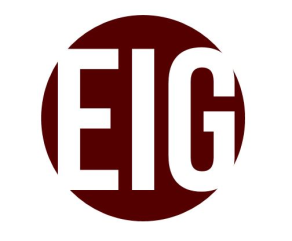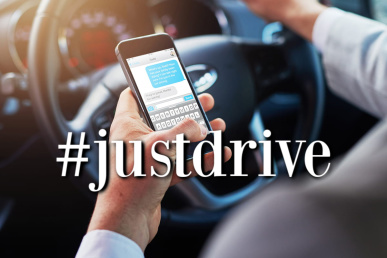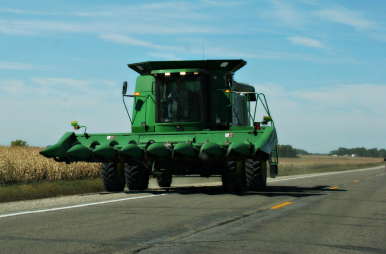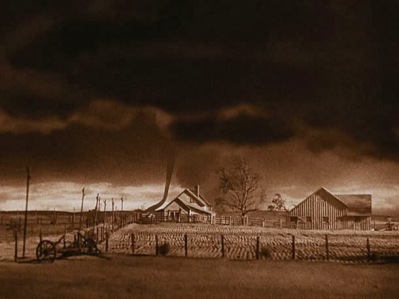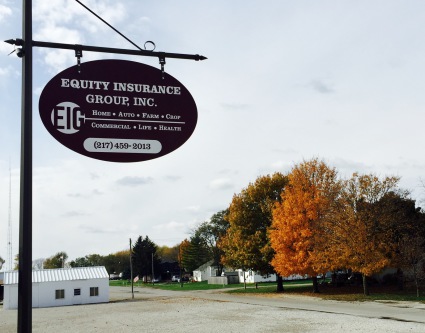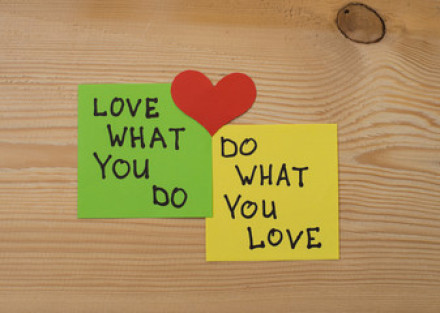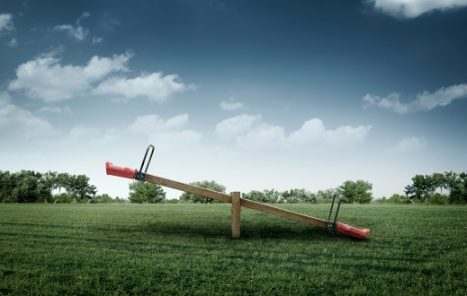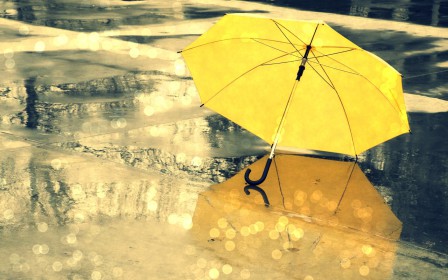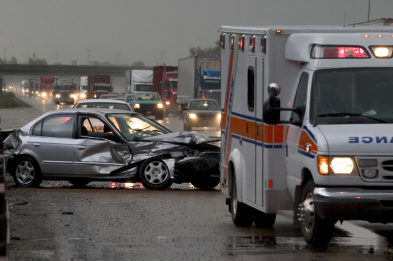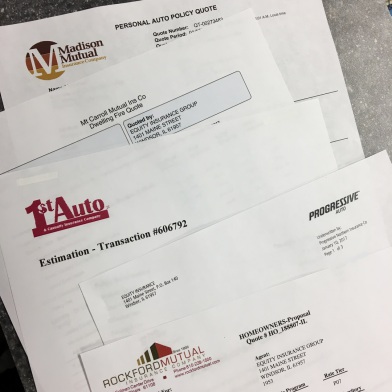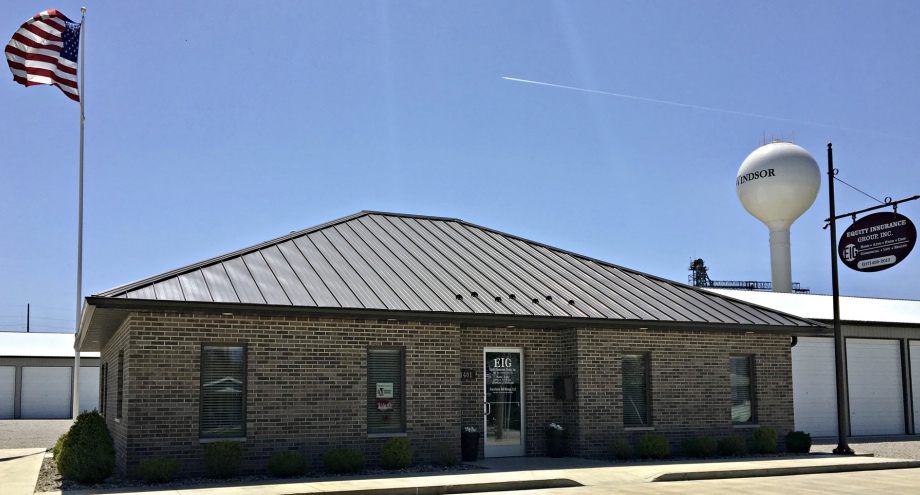
Equity Insurance Group, Inc.'s Blog
"E.I.G. - Entertaining, Informative, Good-to-Know"
#justdrive
April 1, 2019 – By Lindsey Richter
Reaction time. It can make all the difference, in a variety of categories. You go to pull something out of the oven and your finger slips off the potholder – in just a few milliseconds, you feel it and your body does what it needs to do to avoid it (even if that does mean dropping 20 chicken nuggets onto the oven door). Without a quick reaction, that mild burn on your finger would be a blistered, bubbled, stinging mess. You step onto the sidewalk in the winter and start to slip on a patch of ice – your body feels the slide and instantly you jolt and move to correct your balance. Without a quick reaction, ouch.
Parenting: also defined as a series of challenges designed by the reaction-time-gods and implemented by tiny humans who are willing to go to extreme lengths to test your limits. What I mean by this is, children are constantly testing the capacity of their parents' reaction time by spewing bodily fluids (i.e. the three p's), slipping/tripping/falling while walking/running/climbing/breathing, ignoring commands in parking lots, and being overly curious about anything remotely dangerous. As a parent, a quick reaction time is necessary to keep your littles safe. And something that allows you to react quickly, is attention. Paying attention to what your critters are going to try and climb on, fall off of, or stick in the electrical outlet next. Without having attention and focus on what is going on, the ability to react is very limited.
This same principal holds true for driving. If your attention is compromised by loud music, phone calls, texting, emailing, eating, applying make-up, trying to find the last piece of gum in the depths of your purse, or the screaming aforementioned critters in the back seat – your reaction time to avoid an accident is going to be negatively impacted. I know, we've all heard this before. Don't drive distracted! But guys, in just an instant, in literally a second or two, if you're not paying attention – your entire life can change, forever. That's all it takes folks. I recently had a close call involving a motorcycle (where the other driver made a poor judgement call), and I could not have spared a few seconds to react – had I been distracted, the result would have been very, very bad. It would be nice if we had a little fortune-teller birdie on our shoulder to nudge us and say, hey, today's the day you really need to pay attention while you drive. But life doesn't work that way. We can't see into the future. Instead, turn down the music, pull over to make that call or send the text (or just wait), eat at a table, forget the make-up (you're beautiful as you are), organize your purse later, and stop the car if the kids are getting out of hand. It's just not worth it. Your life is worth more. The lives of others are worth more. Just pay attention. #justdrive
-Lindsey
The Harvest Hustle
September 17, 2018 – By Lindsey
Richter
Annnndd they're off! It's "go-time" ladies and gentleman. Harvest 2018 is underway. This probably means one of three things for you: 1. There are a ton of long work days and nights ahead of you a.k.a. you're a farmer, 2. You will barely see members of your family for an extended period of time a.k.a. you are the family of a farmer, or 3. You should allow extra time to drive everywhere you go because you have about a 90% chance of getting behind a very large, slow moving piece of machinery a.k.a. the rest of the people in the Midwest.
I grew up on a small grain farm. I loved my upbringing and the experiences I had. And I appreciate the heck out of farmers and their families. It's tough work. Stressful work. But, I was absolutely not heartbroken that I married a non-farmer. I've had my fill. Still love the atmosphere and the culture, but I’ll just stay over here, a safe distance from any tractor driver's seat.
I could go on about the importance of farming to our community, state, country, and all of our individual lives. But what I really want to hit on is road safety. Now, understand that I TOTALLY get it from both sides. I've been that impatient person behind the combine, tractor, grain truck... I'm just trying to get from point A to point B by this certain, specific time, and have allowed little room for error in my schedule. While being pushed for time is my fault, I am guilty of venting some frustration to my windshield because regardless, you're in my way. I just want to drive 55-60 mph and be on time, and instead I'm stuck driving 20 and there's an incessant line of cars in the oncoming lane of traffic. It's an annoying situation. Been there, done that, will likely do it again.
Also, believe it or not, I have driven a large piece of machinery on the road – a highway even – and it was awful. For a couple farming seasons, I helped my dad harvest by operating a grain cart. For those not well-versed in this language, this means I drove a fairly large tractor that was pulling a wagon with an auger. I would drive side-by-side, next to the combine, allowing my dad to continue harvesting while "unloading-on-the-go" – thus quickening the process so he wouldn’t have to stop to unload the hopper. Anyway, as you can imagine, grain cart operating is not my strong suit. After a couple days, I would get the hang of it. But then, there would be a whole year before I would attempt the task again, meaning I had to re-learn everything the next harvest. But to get to the point, yes, on one venture my dad convinced me to haul the tractor and grain cart home from the field, which included a small amount of driving on the highway. I was quite aware that I was holding traffic up, but really couldn't do much about it. It's huge, the roads aren't designed to comfortably fit a tractor and wagon that size. But you have to get from here to there, and unless they invent flying tractors and combines, the roadways are the only choice.
Farmers are in a hurry too. A big hurry.
Trying to get the corn/beans money out of the field and to the elevator or grain bin at the right time, at the right moisture level, before something breaks or it rains. Things often
break and rain is usually inevitable, so things rarely go according to plan. Bottom line, farmers are trying to get to where they're going too, just like every other vehicle on the road. They just
happen to be much slower and much larger than you. When you pit a tractor or combine against a car, the car will always lose. Being in a hurry and not respecting farm machinery on the road is a
recipe for disaster. In 2015, nearly 500 accidents involving farm equipment on the roadways were reported in Illinois. When considering that farming season is only a portion of the year and not in
all areas of the state, that's really quite a few accidents.
So here are some things to remember to keep you, your family, and our farmers safe this harvest:
-
Be alert and slowdown in plenty of time! Avoid distracted driving.
-
Try and be patient (re-read the above). Farmers know they're slow. But they have to get where they're going too.
Before passing farm machinery:
-
Check to make sure they're not turning left; slowing down and pulling slightly to the right often means they are preparing to make a wide left-turn.
-
Make sure the road is wide enough for you to pass safely.
-
Look for roadside obstacles such as mailboxes or bridges.
-
Make sure you have enough distance and time for you to safely pass!
Be patient. Slow down. Pass wisely. And thank a farmer. After all, food is delicious. Have a safe and bountiful harvest!
-Lindsey
“Not Just Corn Fields &
Cow Pies”
August 8, 2018 – By Lindsey Richter
Why hello, August!... So nice of you to show yo' hot, sweaty-self. It really is a great month. Yes, it can be a bit sweltering – I can’t tell you the number of times I’ve heard about how hot it was the day my parents got married – it was August 20th, 103 degrees and no air conditioning in the church, somebody passed out I think… yada yada. But besides the heat (which I happen to like), it’s one of my favorite months. Everyone is trying to soak up the ounces of summer sun, cramming in all the activities and experiences they haven’t checked off their list yet. And then of course, the dreaded (yet simultaneously exciting) back-to-school time. But being born and raised in Windsor, the one thing that ALWAYS comes to my mind when I think of August is the Windsor Harvest Picnic.
When we were kids, there were few things more
exciting than "The Picnic". We saw our school friends again – us country bumpkins were a bit more isolated than the town kids. My grandparents always gifted us with quite the pile of carnival ride
tickets and we rode rides nearly until the carnival shut down every night. The greasy, glorious food: french fries, corn dogs, and my personal fave – elephant ears (the lesser known brother of the
funnel cake and, in my opinion, 50 times better). It was fantastic. Any '90s kids out there remember "The Cobra" ride?? It was basically a pillar of my childhood…… Now yes, I know, Windsor's pretty
tiny. No, "The Picnic" isn't any State Fair or Six Flags, but it's pretty complete with free musical entertainment, great food, raffles, a 5K, pedal tractor pull, a parade, and all your friendly
neighbors.
The Windsor Harvest Picnic is the longest running community festival in the county, and according to EnjoyIllinois.com (you know, the promotional TV commercials that make Illinois seem like the top vacation destination in the country, with the super catchy, trendy background music) it's the longest running festival in the state. Say whaaa??!! Psshhhyeah, I know! And this is all thanks to the volunteers and coordinators who do the hard work of fundraising and planning. They’ve been committed to keeping the tradition going for over 120 years.
So, mark your calendar now: August 16-18, with a FULL day of activities on Saturday, August 18! For a complete line up of the events, check out: http://www.lakeshelbyville.com/events/windsor.htm or Windsor Harvest Picnic’s Facebook page at https://www.facebook.com/windsorharvestpicnic/ . Also, come by our office on 1401 Maine Street to pick up a handy-dandy booklet! While you're in town for the Harvest Picnic, check out the other great places to visit: Windsor's Pub, The Lucky Dog Pub, Old No. 1, Windsor Food Center, Fox Prairie Golf Course… oh yeah, and us here at Equity Insurance Group! Not to mention we're a Lake Shelbyville Community – hollaaa!! #lakelife Yeah, Windsor may be little, but we pack a punch. And we love it.
See ya soon!
-Lindsey
Lions, Tigers, Tornados, Oh My!
May 17, 2018 – by Lindsey Richter
Finally! I think we’re on the fast track to summer now! For a while there it was like the cold, winter nightmare that wouldn't end. Am I right?! I LOVE warm weather and all that it brings…… with the exception of storms. I just really don't care for storms. In fact, I used to be so scared of storms I would almost get physically sick as a little girl. I was terrified that a tornado was going to come through and destroy our house. Maybe it was the Wizard of Oz's fault with the scary tornado tossing Dorothy's house like a toy. Also, the freaky flying monkeys… nothing to do with weather but let's be honest, they just added to the whole traumatizing experience. I mean, for the love!! Were they necessary?? Definitely not an essential part of the story line, in my opinion. Scarred me for life. Anyway, I've had a deep fear of tornados and storms (along with flying monkeys) as long as I can remember. Thankfully, I've learned to cope a lot better than I did when I was 7, though those unpredictable, middle-of-the-night storms can still get the best of my nerves. Unfortunately, storms are a part of weather and therefore life. However, of all the natural disasters (hurricanes, earthquakes, tsunamis, mudslides, volcanos) I think I'll take the slight chance of a tornado versus the possible alternatives.
Though the intensity of my storm/tornado fear when I was little may have been slightly irrational, the fact is they can be a little scary. And they can be damaging. Hail, falling tree limbs (or trees), straight-line winds, lightning, flying cows (thank you Twister), and yes the feared tornado – can all cause massive property damage. In the event this happens to you, you may need help paying for repairs to your damaged property whether it be your roof, siding, windows, vehicle, etc. That's where insurance comes into play. If you decide you need your insurance to help pay for repairs, a claim is started for the property loss, and the insurance company then proceeds to determine how much they owe you to help you fix the damage. But do you know how they determine what they owe you? In some situations, this can be a complicated, multi-factorial process but we're going to focus on the basics with the two main types of loss settlement terms: replacement costs and actual cash value.
Replacements costs (RC) is basically what it sounds like – the insurance will cover the costs of replacing the item or structure. This most commonly applies to houses. If your home is in fair to excellent condition, it can generally be written on a homeowner policy with RC terms. This means that if it burns to the ground, they would pay to re-build your house from the ground up to the amount it’s insured for. This is why typically homes are insured for above and beyond their market value – it costs more to build than to buy. Also, if some other type of smaller damage occurs, say siding damage after a hail storm, they will pay whatever it costs to replace the property with identical materials back to its pre-loss condition.
On the other hand is actual cash value (ACV). ACV is also basically what it sounds like – the insurance will pay you the cash value of the property damaged, also known as the depreciated amount. This most commonly applies to older property that isn't in great condition, vehicles, and often to a roof if it is beyond 15 or 20 years old. If you think about it, this makes sense. For property that is in not-so-great shape or depreciates quickly, the insurance company will not pay more than the property's value to repair it.
In the claims process, once the insurance company is notified of the loss, an insurance adjuster is sent to assess the damage. They then take that assessment, talk with the policyholder, the company involved in completing the repairs, and find an agreed on amount to pay. Typically in a situation where the property is insured for RC, the insurance company will first pay out what the ACV amount would be, and once the repairs are actually made to the property, then they will pay out the rest to meet the full RC. This is done to protect the insurance company in an instance where the policyholder decides to spend the loss payment for something other than damage repairs.
So, what a timely post, right?? We hope everyone stays safe and damage-free this spring and summer storm season, but if not – that's what insurance is for! Have questions regarding your loss settlement terms? Not sure where to look for this information? Looking for better customer service during a claim? Give us a call.
-Lindsey
This Is Us: Lessons in life & insurance.
February 15, 2018 - Lindsey Richter
*spoiler alert – events of the two most recent episodes of This Is Us will be referenced*
I admit it. I've been bitten by the "This Is Us" bug, along with 12 million other Americans. But… I didn’t just hop on the bandwagon. I was a fan from the get-go. I found myself intrigued right from the beginning, starting from the night I just accidentally caught some of the first episode. Even if you're not a fan, you have to admit – the plot is interesting. An adorable couple, madly in love find themselves pregnant with triplets by happenstance, setting forth a series of events intertwined in love, tragedy, hope, heartbreak, forgiveness…the list goes on. Not only do we see their story in present-day, but we also get the back story as the episodes jump around in time from past to present and even a bit to the future. This increases our fascination and the hype as we only gradually collect all the pieces of their puzzle.
The characters are likeable and relatable. Kate with her constant struggles with weight and self-acceptance, Randall with his constant pursuit of perfectionism and underlying anxiety, Kevin with his lifelong quest for identity and purpose, Rebecca with her trials in marriage and motherhood, and Jack. I mean, who doesn't love Jack?? The ideal husband and father, a picture of strength, but not without his own baggage. And the bond that weaves so strongly between them all. Also… can we just talk about the old doctor for a moment? Listening to him talk just makes me want to sit down with him in front of a fireplace with some hot chocolate and tell him about all my troubles and life questions. I'm sure he would make them all better. He's just so cute and old and wise. Ok, moving on….
Finally, a couple weeks ago, we all learned the details of Jack's fate. It was tragic. Hard to watch. Traumatic to say the least from beginning to end. The all-consuming, massive blaze as they struggled to escape, the fear that gripped us as Jack re-entered, the relief when he emerged with dog in-hand, and oh the anticipation – we all knew it was coming at some point in the episode. At last, the hard and fast release of overwhelming grief as Rebecca and the kids learned of his passing.
In a situation of overwhelming loss and grief, it's almost natural to want and place blame on someone or something (hence Kevin and Randall's funeral dinner spat – come on guys!). So let's just get it all out of the way now…. The freaking slow-cooker! Ugh! It was faulty – should've been thrown out. The missing battery in the smoke alarm – Rebecca and Jack both knew it needed replaced. Guys, that's homeowner safety 101. Jack – keep the kitchen towels away from hot appliances, man! And Jack (I'm sensing a theme here), no matter how beautiful you are, you are not superman – don't go running into burning buildings, dude!
But, blame doesn't really help here. Shoulda woulda coulda – it's futile. What does help in the event of tragedy, at least in some respects, is insurance. Having ample homeowner insurance would mean that Rebecca and the kids could have their house rebuilt and personal property replaced. It would also help to pay for a place for the family to stay while the house is rebuilt. Their unfortunate story is a good reminder to make sure your own home is fully covered. If you don't own your home but rent, your landlord's insurance policy does not cover your personal belongings. You would need a renter's policy for that coverage.
Insurance doesn’t take away the pain of losing everything in a fire, but it does help to get back to a sense of normalcy quicker and easier. Insurance also won't bring Jack back, but if he had a life insurance policy, then it would take some of the burden off Rebecca for funeral expenses, the continued expenses of raising three teenagers at once, any upcoming college tuition they have, etc. The episode also brings to mind some good safety reminders. Check and double check that appliances are off at night or before leaving the house. Check frequently that smoke detectors are working. Be conscientious of any potential fire hazards in your home.
So what’s the overarching takeaway here? Treasure time with your family because life is fragile, and review your homeowner policy to make sure you’re fully and sufficiently insured. Also, smoke detectors save lives. Smoke inhalation is very bad for you. And wise, old doctors can make anyone feel better. This Is Us. Full of lessons in life, and in insurance. Such a tragic, heartwarming, wonderful, captivating, just all around lovely story. Life isn't always beautiful, but it is a beautiful ride.
-Lindsey
Life Insurance: If Not Now Then When?
January 11, 2018 – Lindsey Richter
Welcome, my fellow millennials! And if you're not a millennial, I'm so glad you're here too! This topic crosses most generational lines (except perhaps the youngins and if the first number of your age is greater than 5). But for us millennials (those who entered the world between the early 80s to mid-90s), I feel it's especially important and time is of the essence! But before I get ahead of myself…..
As millennials (just like most people on the planet), we're pretty attached to our social media accounts. We just can't help it – we need that connection. We need to know. We don't want to miss anything! One thing I've noticed that saturates my newsfeed more than anything else right now is baby/kid pictures. There's literally been like 20 of my Facebook/Instagram friends have babies in the past 2 weeks. And by 20, naturally I mean 5. But still, they're poppin' up like dandelions in June. Good gracious! My husband and I welcomed our own new little dandelion this past May, so by no means am I complaining here. The oodles of baby pics I scroll through are seriously adorable.
As us millennials glide gracefully through our 20s and into our (eek!) 30s, many are plunging boldly into the realm of parenthood. Though the days are long, the tantrums ferocious, and the nap-less afternoons exhausting, these baby years truly are precious. And we all hope to grow old and always be there for our bundles of joy or just simply live well into our older years. However, the unfortunate reality is that life is fragile. Unexpected and tragic things can happen. I know, the tone here just totally shifted and got a lot more drab and dark. My apologies… But as a parent, you're forced to face this possibility. When you become responsible for little lives, you have to up your "adulting" to a new level. And that means life insurance. Even if you're not a parent, it's important for you too. The question you need to ask is: will someone in my life be negatively affected financially should I unexpectedly pass away? If the answer is yes, do those you love a favor and keep reading.
Life insurance is a big topic, and it can get a little complicated, so we'll keep it pretty simple for now. But the basis is that you purchase a set dollar amount policy ($50K, $100K, $300K, $1 million). If you pass away during the policy period, the insurance pays your beneficiary that dollar amount to help take care of funeral expenses, outstanding debts, raising your children, etc. Most policy periods are 10, 20, or 30 years -- but again, there's many different kinds. So if you purchase a $100,000 30 year policy when you're 30 years old, and you pass away at 45, the policy would pay your beneficiary (usually your spouse or whoever the guardian of your children is) the $100,000.
One of the most important things to know about life insurance is that it pays to buy it when you're young. So listen up millennials! If you buy a policy when you're 25 or 30, you'll lock in a much lower premium than if you wait to buy one until you're 40 or 45. For example, my husband and I each have a $300,000 30 year policy we purchased before we had our first son. We each pay roughly $200 a year. So if we get in a terrible accident together and both pass, the insurance will give our children's named guardians a combined $600,000 to pay off our debts and help raise the kids into adulthood. I can sleep much better at night knowing that things will be taken care of should I leave this world young. My untimely passing wouldn't be a burden financially on my husband or children's guardians. That's worth above and beyond the $200 a year to me.
Now my personal example is just that – an example. There are several factors that play into how much you'll have to pay for a life insurance policy: your age, health status, smoker vs non-smoker, male vs female, etc. And as I mentioned, there's several different kinds. But hopefully this post will get you thinking and give you a little motivation to seek out some more information about a life insurance policy. It's not fun to think about the possibility of our time on Earth being cut short, but for the sake of those we love, we can't not think about it. And it pays to think about it sooner rather than later. So, have more questions? Need to get a policy started? Give us a call!
- Lindsey
Forget a Good Neighbor, We’re Like a Great Neighbor!
November 7, 2017 – by Lindsey Richter
Until I became an insurance agent, I never realized how many commercials are on T.V. for insurance companies. I'm sure you would be able to name several big-name insurance companies just off the top of your head, maybe even recall specific commercials that they run and re-run. For instance, that Jacob guy, from you know where, wearing the tan pants…. (she sounds hideous).
As a consumer, you're bombarded with advertisements from all of these different, large companies. Drive through any town with more than a few thousand people and you'll likely go by several different insurance agencies. And, there's also probably some independent insurance agencies that you may not have heard of. So, that brings us to the question at hand… what's an independent agency and why should you consider one for your insurance needs? Well, let me enlighten you.
Recently we had a call come in for an auto insurance quote. The lady on the other end of the line was referred by a family member, and she asked "Now you guys can shop around for us and get the best deal?" "Absolutely!" I replied. This is one of the greatest benefits of an independent insurance agency. We have access to a number of different insurance companies to write policies with. We’ll run several different quotes and find the one that has the best coverage and best price for you. If you go to a big-name insurance agency’s office, they'll likely only be able to get you one quote from their one company. But not us! We do the shopping around for you, and show you the best deal. Like a personal shopper – sign me up!
Some of the big-name insurance companies also promote going to their website and buying insurance coverage yourself. This brings me to my second point – at an independent agency you have access to insurance experts. We're licensed in the field of insurance, meaning we have to meet standards and pass an examination to be able to sell policies, and also have to complete ongoing continuing education. We all use the internet for so many things these days, and obtaining insurance online is growing more popular and may seem simple. BUT! Do you know what those numbers really mean? Do you know if that's actually the right coverage for you? And, wouldn't you rather have a real person who is an expert make sure things as valuable as your home, your vehicles, and other assets are insured fully and properly? I know I would. Though in general we don’t advise you to shop online for you own insurance, most of our companies do embrace the internet and have online account sites available where you can log-in, manage payments, view policy documents, etc. for your convenience.
Another reason you should consider an independent insurance agency is because we, the agents, are your customer service department. You don't have to call a 1-800 number, press 1 to hear English, press 4 for customer service, and leave a message for them to call you back (maybe) when all the lines are busy. We handle the customer service issues for you. Have a billing issue? Call us. Have a possible claim? Call us. Not sure about something on your policy. Again, call us! If we don't have the answer right away, you can bet we'll find out quickly. One phone number and a live person, how simple is that?! Many of our companies are also regional versus national – meaning, they themselves are often easier for us to work with. We usually talk to the same people when we call with a question, they return our calls in a more timely manner. Quicker, more consistent replies and solutions = better customer service. Period.
There’s a lot of options out there for
your insurance coverage. But with an independent insurance agency, you really get more – more value, more service, more expertise. So, give us a try. We are a locally owned and operated independent
agency offering home, auto, commercial, farm, and crop insurance. We're here for you to make sure you have the right coverage for the right price and take care of all your needs along the way. Call,
click, or come in today!
Thanks for reading!
- Lindsey
Why I love being an insurance agent!
September 14, 2017 – by Drew Warf
When Lindsey and I were discussing what our next blog topic should be we talked about a lot of different topics that would be beneficial for our insureds to know about, named perils, ACV vs. RC, and the list goes on… However, we kept coming back to the idea of telling people why we love doing what we do so much. Since I’ve been at a little longer than Lindsey, I’m taking the helm on this one!
Not many little girls dream about becoming an insurance agent (probably), including me. However, all through high school and even college when people asked me “What do you want to be when you grow up?” or “What do you want to major in?” I never really had a clear answer or vision. There were interests along the way, but nothing that really stuck. So college came and went and I got a job working in retail management, which I LOVED! Helping customers every day was one of the most rewarding (albeit sometimes the most frustrating) things I’d ever done.
Helping someone find exactly what they were looking for or guiding them in a direction they didn’t even know they needed to go was an amazing feeling. Knowing that I’d accomplished my goal of helping them and they were happy is all anyone can ask for in a job. So when the opportunity came up to work as an insurance agent with my family, I was a little apprehensive. Leaving a career that I loved doing and going into a new field was scary, but it was something I couldn’t pass up. Most importantly, I knew I’d still be able to work with people and help them find what they were looking for.
Little did I know that I would end up loving it even more than my last career! When someone is shopping for insurance, they’re not walking out with an item, but instead a guarantee. A guarantee that their home, possessions, car, or livelihood are not at risk if something unfortunate were to happen. I genuinely care about each and every one of our customers and the things they insure and want to make sure they are covered when they leave our office. Walking through and explaining their coverages, deductibles, and what exactly all that means is so satisfying when I see the sense of understanding come across their face. When someone comes in and we find them better coverages to fit their needs, I love that they can sleep a little better at night knowing they are taken care of.
Of course I love to save people money too! A healthy appetite for competition runs in my family, so I find “the chase” of quoting to not only find people great coverage, but save them money too, very exciting. It’s music to people’s ears when I can save them hundreds of dollars a year on their insurance. Don’t get me wrong, there are those frustrating times when there’s nothing I can do and that’s okay. It just makes the next opportunity even more of a challenge.
Now that I’ve been doing this for a while I can truly say that I do love being an insurance agent. Every day is different and presents a new challenge. There will be ups and downs, with insurance there will always be claims and loss, but knowing that I get to help people every day makes everything worthwhile. All I can do is hope that people feel taken care of! If that’s happening then I feel I’ve done my job and will continue to love being an insurance agent for many more years. Thanks for reading!
-Drew
One goes up, the other goes down.
August 15, 2017 – by Lindsey Richter
Inverse relationships. Predictable. Easy to understand. Otherwise defined as when one
thing goes up, the other thing goes down. You can find examples of inverse relationships in math, science, and also everyday life. Especially life with a toddler. For example, bedtime. Bedtime is
absolutely not directly related to their wake-up time the next morning – it is inversely related. Always. Go to bed at 8 p.m., wake up at 7 a.m. Go to bed at 10 p.m., wake up at 5:30 a.m.
Early to bed, early to rise. Late to bed, early to
rise. Another case, if you have 30 minutes to be somewhere, the toddler will walk quite nicely to wherever you need to go. Should you be running late and have merely 10 minutes to get there, this
said toddler will walk at the speed of frozen snot instead. The less time you have to spare, the more slowly he'll walk. And hey, maybe even walk backwards – as was my experience this morning during
drop-off. I really thought he was walking behind me on the sidewalk. Incorrect. He was walking backwards. Slowly and backwards – would that be like
a double-inverse relationshi…. yeeeaah, I don't even know. It's just the way the world works. It's in their innate, internally programmed toddler handbook. The Rules of Toddlerhood. Rule #1:
drive mommy mad. Rule #2: look really cute and say adorably hilarious things that also make mommy love you so much and forget her madness, convincing her to give birth to more adorably maddening
friends for you.
While the behavior of a toddler can sometimes be used as an example of an inverse
relationship, they are also complex, unpredictable beings beasts so it doesn't always hold true. In contrast, enter: insurance deductibles. Deductibles truly do hold a predictable, inverse relationship with insurance premiums. As one goes
up, the other goes down. But let's back up here, and make sure we're all on the same page. You may have heard the term deductible, but do you really have a good understanding of it? Understanding
deductibles is important because it impacts how much $$$ you'll have to spend on insurance – whether it's up-front on your premiums, or the amount of money you have to pay for a car or home repair.
The deductible on an insurance policy is the amount you'll have to pay out-of-pocket in the event of a loss. And a deductible applies to your own property only. It would not apply to the cost of
fixing your neighbor's car you backed into or if your ex-best-friend tripped over a garden hose in your yard, broke their leg, and are suing you. Losses related to other's property and your liability
usually do not apply – but, you would have to pay the deductible to get your OWN car fixed after you hit your neighbor’s car or to get your OWN house repaired after a kitchen
fire.
You can typically choose from a variety of deductible amounts on your auto and home policies. Auto insurance policies require a deductible for the collision and comprehensive coverages. Collision coverage would pay to repair your vehicle should you be (you guessed it!) in a collision. Comprehensive coverage would pay for repairs caused by events you really couldn’t have prevented and that don't involve you hitting another car or piece of property (for examples, see our Auto Insurance FAQ’s-Part 1 blog). Collision and comprehensive coverage require you to pay the deductible out-of-pocket and then the insurance company will pay for the remainder of the repair bill. So, if you hit a telephone pole (collision) or if Bambi meets a tragic end with your car bumper (comprehensive), you would have to pay your respective deductible out-of-pocket and then the insurance company would pay for the remainder of the repair bill. For a simple example, if the damage is $2000, you have a deductible of $500, so you will have to pay $500 and your insurance company in-turn will pay the remainder -- $1500.
Like auto policies, homeowner insurance policies also contain deductibles, and offer various options for higher and lower deductible amounts. The deductible for a homeowner policy works in the same way it does with auto insurance. Should damage occur to your house – from fire, wind, hail, vandals, etc., you would have to pay the deductible first, and then the insurance company would cover the remainder of the repair bill. Again, for liability situations, deductibles usually do not apply.
Now, getting back to the idea of deductibles and premiums having an inverse relationship… let’s talk $$$! The general rule is, the lower your deductibles are, the higher your premium will be. The higher your deductibles are, the lower your premium will be. The cost of your auto insurance premium is broken down by coverage – liability, collision, comprehensive, towing/rental, etc. The cost of each of the coverages put together add up to your total policy premium. Typically, the collision coverage of a policy is the most expensive part – therefore, adjusting the deductible for this coverage may make the most difference in the overall premium you have to pay. As one goes up, the other goes down.
Now, there’s typically a lesser amount of premium attached to your comprehensive coverage. Therefore, raising or lowering the comprehensive deductible will not impact the premium as much as raising and lowering the collision deductible. But it will make some difference – again, as one goes up, the other goes down. And just like with auto insurance, the higher the deductible you choose for your homeowner insurance, the lesser your premium will be – and the opposite is true. One goes up, the other…. yeah, you get the point.
Now, what deductible amounts should you choose on your policies? Well, that's something you'll have to decide for yourself. How much can you afford to pay out-of-pocket should you experience a loss? How much premium can you afford annually? One way to analyze this: say a $2500 deductible saves you $500/year in premium verses a $1000 deductible. After 3 years, the money you would save in premium covers the extra you would have to pay out-of-pocket if you had a loss ($1500). Nobody can anticipate having an insurance claim or a tornado roaring through their neighborhood, but if paying $2500 out-of-pocket wouldn't break you financially, a higher deductible might be something to consider – and if you're claim-free, it may save you quite a bit in the long run. If your money situation just doesn't allow for you to afford an out-of-pocket $1000, $2500, or $5000 repair, then maybe it's worth it to pay a bit more premium for a $500 or lower deductible.
Sooo… tah dah!! Deductibles explained. Also, I successfully linked life with a toddler to the subject of insurance. You’re welcome! But on second thought, toddlers are basically the epitome of destruction… so, perhaps that isn't much of a feat after all. Regardless, take some time to check your policies. Think about your deductibles. Make sure they make sense for you financially. Questions? Give us a call and we'll be happy to help!
- Lindsey
Under My Umbrella-ella-ella-eh-eh-eh…..
May 16, 2017 by Lindsey Richter
It's May, people!! Meaning warmer temps (finally!) and beautiful flowers – thanks to those pesky April showers. AND it's almost time for all the fun activities that come with sunny, outdoor weather! We're talking pools, boats, ATVs, backyard BBQs, and the like. I love it! However, thinking about these fun things while simultaneously being immersed in the world of insurance day-in and day-out led my mind to one thing – umbrella policies! Yep, that's right. Those wonderful little safety-net-type policies which can make a big, big difference if you ever find yourself in a sticky liability situation. I know, I know – I just saw your eyes glaze over at the term "liability", but hear me out here!
According to my husband (who is optimistic-to-a-fault), I am a pessimist. However, like most accused-pessimists, I strongly disagree and call myself a realist. I like to be realistic. I don't like to get my hopes up just to be disappointed. I prefer to acknowledge the reality of situations so that if it turns out less than optimal, I don't feel unprepared. As author Stephen King has said, "There's no harm in hoping for the best as long as you're prepared for the worst." I like to hope for the best, but I also can't help myself from thinking about the worst. And as part of responsible "adulting", acknowledging the possible reality of the unexpected is really important. You work hard! – for your cars, your house, your savings, your kids' futures… it's smart to be prepared. And one of the biggest ways you can be prepared is to make sure you're amply insured.
You may have never considered an umbrella policy before, but bottom line: if you have assets you want to preserve, you should strongly consider one. So what does an umbrella policy cover? Well, long story short, it will cover damages you owe someone in a legal suit or settlement in the event that it exceeds the liability coverage of your home or auto policy. Otherwise, if you can't pay out of pocket, a lien could be placed on your house, your wages could be garnished, and your savings or other assets could be at stake.
How do I know if I need an umbrella policy? Well, there's two preliminary questions to consider.
1. What do you have to lose? Are you just starting out, young, living on ramen noodles, broke, renting, healthy, don't have a lot up for grabs? Then perhaps an umbrella policy isn't necessary for you right now. In other words, if you wouldn't lose much in a major lawsuit, you might be fine without one.
However, if you do have a considerable amount of net worth – what you own minus what you owe – then it's likely you should consider purchasing an umbrella policy. To figure your net worth, add the value of your home, vehicles, savings & investments (assets) and then subtract the value of your mortgage, car loans, and other debts (liabilities). Because your future earnings could also be garnished up to 25% in a judgement, you may also want to consider multiplying your annual income by five and adding that amount to your asset total. So, your liability coverage from your home and auto policies should be enough to fully cover your net worth – if it isn't, an umbrella policy might be a good idea.
2. How risky is your lifestyle? There are several factors to consider, so I'll list them quickly: do you have a pool or trampoline, do you own several vehicles especially high performance ones or have several drivers in your household, do you own recreational vehicles including boats, do you entertain frequently or host large parties, how involved in social media are you, do you serve on any board of directors especially those for charities or non-profits, do you own vacant land, are you a landlord, is your home under renovation, do you have clients visit your home often? All of these factors increase your liability exposure – your risk of being held liable for an injury to another, whether it be bodily injury or other personal injury.
So… think these questions over – I may sound like your grandmother's broken record, but… "better safe than sorry"! And let's face it, your grandma was one smart lady, am I right?!
The good news is, umbrella policies are not that expensive, especially when considering the amount of coverage they provide. A $1 million policy can run between $150 to $300 annually. So let's just say you have your umbrella policy for 20 years at a premium of $300. At the end of the 20 years, the total premium you've paid still only amounts to 0.6% of the value of the policy coverage. That's a pretty good deal! One thing to keep in mind is that umbrella policies generally require higher liability limits on underlying auto and homeowner policies, so you may need to raise your limits if you do decide to go with an umbrella. Overall, still a lot of bang for your buck!
So, have more questions about umbrellas? Give us a call! We'll get your assets and your livelihood fully covered and protected. It pays to be prepared!!
-Lindsey
I Love You Stinky Face!: A Series of "What Ifs"
March 15, 2017 – by Lindsey Richter
Recently, my wee little one received a book as a gift entitled "I Love You Stinky Face". The book is really quite cute. It brings to life the dialogue between a mother and young son where the child does something most kids do really well… asks A TON of questions. The story begins with the mom tucking the son into bed at night and she says "I love you my wonderful child." With this statement, an invisible light bulb illuminates in the child’s head, and he then begins a series of ridiculous yet entertaining questions which test the conditions of her love. "But Mama, but Mama, what if I were a super smelly skunk, and I smelled so bad that my name was Stinky Face?" The adoring mother replies that she would put him in the bath and try to get the smell off him… but if he still smelled, she would tell him "I love you stinky face." The back-and-forth questions and answers continue with several "what if" scenarios from the boy involving swamp monsters, green aliens, alligators with giant teeth, etc. And each time, the mother replies that she would still love him regardless of which crazy creature he was. That's just what we moms do, right?? – we love our little stinky faces unconditionally! Even when they drive us mad, intentionally spill cheerios on the floor to spite us, walk backwards at 0.3mph to go get their shoes on, take 30 minutes to go potty, etc. Unwavering love: just one of our many motherly superpowers. …Superpowers? Yes, I feel this is an accurate description – I mean, to top it all off, we grow HUMANS for crying out loud. So yes, moms = superheroes! And the mom in this book appears to be no exception.
So, continuing on here, to stay true to our blog's name, "E. - Entertaining, I. - Informative, G. - Good-to-know", I thought I would attempt to entertain you AND inform you with my own series of questions and answers. But I think I'll leave the green, slimy monsters out of it and stick with homeowner insurance-related scenarios. They're important questions to pose!… because, despite how much you want them to be, in some situations with claims and losses your insurance company may not be as grace-filled or forgiving as the mother in this tale. So, let us begin our own version of "I Love You Stinky Face":
*Ahem*
But Mama, but Mama….
1. What if it rains and rains so hard for 5 days and water spills in through the cracks in the doors and there's 10 inches of water in our house? Am I covered?
Sorry Charlie, but you're not covered. Homeowner policies don't cover damages incurred from flooding, only flood insurance would cover this loss. In addition, homeowner policies don't cover losses caused from sewer or sump pump back-up; however, additional coverage can be added to most homeowner policies for this latter cause of loss. But if you want all-encompassing flood coverage, you'll have to buy a separate policy.
2. What if the tectonic plates become confused and think that they're in California and instead of Illinois and we have a massive earthquake and our house cracks in two? Am I covered?
Sorry to burst your bubble again, Chuck, but no. If you want earthquake coverage, this is an additional coverage often with an additional premium that must be added to your homeowner policy. Of course, it's unlikely that those pesky tectonic plates will confuse us here in the heartland for quake-prone, sunny Cali, but never say never.
3. What if a possessed deer breaks down the door and destroys our furniture and everything with its fierce, galloping hooves and 4-foot-wide rack of antlers? Am I covered?
Yes, Charles, you are in fact covered! In this scenario, that crazed deer would be classified as a vandal, and the peril of vandalism would be a covered loss.
4. What if there's a terrible storm and the power goes off for a long, long time and all of our food in the freezer goes bad and we have to go hungry? Am I covered?
Don't fret, Chas, you're covered! Homeowner policies usually cover loss of food in a refrigerator or freezer due to a power outage, often up to $500. You might want to check with your agent on the specific limit on your particular policy, but it should be enough to help you re-stock your freezer and fridge and fill up your hunger-pain-stricken belly.
5. What if our house was built over an old, long-lost jewel mine and one day it just decides to collapse and our house is swallowed up by the mine? Am I covered?
Oh, Chip (ok ok, so this one's a stretch, but I'm running out of variations of Charlie), so sorry but you're not covered, regardless of if it’s a jewel mine or coal mine. For this loss to be covered, you would have to add on mine subsidence coverage to your homeowner policy. So if you live in an area with known mines (Douglas County for example), it might be a good idea to ask your agent about this coverage.
So there you have it! You can all probably think of your own “what if” scenarios to ask. So go ahead, call up your agent – and if you're looking for a new one, call us! We can answer your "what ifs" and get them all covered!
Thanks for reading!
–Lindsey
Auto Insurance FAQ’s- Part 2
February 17, 2017- by Drew Warf
Following up on our previous blog post- today we’ll be answering the final three common questions people have about their auto insurance. We’ve already covered limits and coverage questions, but let’s get deeper into some ins and outs of how certain situations could affect your insurance coverage and what do in an accident. Specifically, these three FAQs will be answered for you today...
- Can I let a friend, family member, or neighbor borrow my vehicle?
- What should I do when I trade in my vehicle or purchase a new one?
- What should I do in the event of an accident?
5. Can I let a friend, family member, or neighbor borrow my vehicle? This question often trips people up because they’re not sure who is covered on their policy. As a general rule, anyone that lives in your household and is licensed must be listed on your auto policy, as well as anyone that regularly drives any of your vehicles (even if they don’t live with you). So all of the drivers in your household are listed and covered to drive any vehicle in most instances, but what about letting your neighbor drive your car to the store because theirs won’t start? What about when Aunt Teresa flew in from Oklahoma and wants to take your daughter to the mall on a shopping spree? The basic rule to remember in these situations is that as long as you have given your permission for them to take your car it’s going to be covered.
Just don’t forget to tell your insurance agent when Aunt Teresa decides to move in for good! Then you might be in a situation where, since you didn’t disclose another licensed driver in the household permanently, the insurance company might not be required to cover any losses caused by that person.
6. What should I do when I trade in my vehicle or purchase a new one? The 1997 Toyota Camry you worked your butt off for when you were 16 has been a reliable vehicle and you’re sad to see it go, but it is 20 years old and time for an upgrade! You research and shop around, finally settling on the perfect new ride. Congrats!! You’re driving around showing off your new wheels and it dawns on you, is my new car covered on my insurance?! There’s a good reason why people aren’t sure of their coverages, the answer is complicated. Coverage on a new vehicle depends on several factors. Here’s a breakdown of the several situations you could find yourself in when purchasing a new vehicle and what’s covered:
- If you have a current auto policy, liability coverage starts on the day you become the owner of the
vehicle. The length of that coverage depends on two different scenarios:
- The vehicle is being added on IN ADDITION TO your current vehicles, it’s covered for liability for 14 days. After that, you must report it to your insurance company to make sure you keep liability coverage on it. If not, after 14 days you could be driving around without any insurance on that vehicle.
- The vehicle is REPLACING any vehicle on your policy, you’ve got liability coverage on it until the end of the policy period. After that point, if it’s not reported to the insurance company, that new vehicle won’t have liability coverages. Everyone’s policy period is different, so make sure you double check or just get the vehicle added on right away to avoid any problems.
- If you’re wanting to have full coverage on the new vehicle there are different guidelines to take into
consideration:
- If you currently carry either comprehensive or collision coverage on AT LEAST ONE vehicle on your policy, the newly acquired vehicle is automatically covered for 14 days. After that, any physical damage to your brand new vehicle caused by an at-fault accident wouldn’t be covered.
- If you carry NO comprehensive or collision coverage on any vehicle on your policy, a new vehicle is still automatically covered! But only for 4 days. So if you buy a new car on Saturday, you’ve only got until Tuesday to make sure you’ve got full coverage on it. Otherwise, you could be driving around your brand new car without any physical damage coverage!
7. What should I do in the event of an accident? Unfortunately, this question is one that oftentimes people don’t consider until they’re in the moment. This is unfortunate for a couple reasons: first of all, it’s a stressful situation and not everyone is prepared to handle those situations rationally; and secondly, if not handled properly it could cause serious problems when it comes down to getting a claim paid or not. There’s a few things to always remember when you’re in a fender bender of any kind:
- Stop, turn off your vehicle- if you’re not injured move out of the way of traffic, if possible.
- Check on others involved- call 911 if there are any injuries.
- Call the police to the scene- even if the accident is minor, having a police report is helpful during a claim and when determining fault. Refrain from admitting fault or casting blame on other drivers.
- Get as much information as possible- while waiting on police, get the other driver’s name, phone number, and insurance information. This will make any claims go much smoother. You should also receive a “driver exchange report” from the police officer.
- Take pictures of the scene- sometimes traumatic events can be hard to remember and pictures at the scene can come in handy in a claim.
- Finally, call your insurance agent to inform them of the accident and see what your next step is towards turning in a claim.
I’ll admit- it’s a lot of information to digest, let alone remember. For that reason, it’s important to review your coverages periodically and make sure you have the coverages you need. At Equity Insurance Group, we’re here to help! If you’re an existing customer, we make it a point to review your coverages annually and let you know if we think you need to make some changes. Even if you don’t have your insurance with us, we’re more than happy to give you a free quote and review your coverages. We come up with comparison quotes so you can see an “apples to apples” comparison, but also a recommendation for where we think you should be based on our conversations with you and an assessment of your needs. There are many more questions that could arise when shopping for auto insurance, so if you don’t find the answer here, give us a call or come in and we’ll be happy help J
Thanks for reading!
-Drew
Auto Insurance FAQ’s- Part 1
January 26, 2017- by Drew Warf
Let’s be honest…how many of us think about our auto insurance other than when we pay it, put the new cards in our vehicle, or (unfortunately) get into an accident? Probably not often…it’s usually approached with a “set it and forget it” mentality. However, auto insurance is probably slightly more important than “setting” your rotisserie chicken for dinner and “forgetting it”. So what do all of those terms really mean? Do you really have the right coverages to suit your needs? At Equity Insurance Group, we decided to come up with a list of “Frequently Asked Questions” to give you a better idea of what your auto insurance really covers.
- What liability limits do I need?
- What does full coverage mean?
- What does comprehensive coverage mean?
- What does collision coverage mean?
- Can I let a friend, family member, or neighbor borrow my vehicle?
- What should I do when I trade in my vehicle or purchase a new one?
- What should I do in the event of an accident?
This week we’ll be covering questions 1 through 4- so stay tuned for future blog posts!
1. What liability limits do I need? Most people know that having car insurance in Illinois is the law and that there are “state minimum” limits. There’s been many times I’ve heard customers say, “Just get me whatever coverage will make me legal.” That’s a nice thought to make sure you don’t break the law, but it goes a lot deeper than just not getting an insurance ticket the next time you’re speeding on the way to work. As Lindsey touched on in our last post, it’s important to evaluate your assets and make sure those assets are covered in the event of an accident you’re liable for. For example, the “state minimum” car insurance requirements currently are:
- $25,000 - injury or death of one person in an accident
- $50,000 - injury or death of more than one person in an accident
- $20,000 - damage to property of another person
When it comes down to it, those limits would cover very little in the way of medical bills or damage to another vehicle (especially if you pick out that brand new Lexus to swipe in the parking lot). If you only have the minimum limits and the damage you cause goes above that, you would be personally responsible for paying anything above and beyond those limits!
2. What does full coverage mean? Time and time again we have customers say, “I should know this, but what exactly does full coverage mean?” Most people get to a point in our life where the auto insurance we purchased in our teens or early 20’s is still sitting there the same as the day you bought it and what it actually covers is a mystery. Sometimes people are too embarrassed to even ask because they feel like as an “adult” they should know--- trust me when I say that you ARE NOT alone if you don’t know. The term can vary in meaning from company to company, but generally it means you have at least the minimum state required liability coverage, comprehensive, and collision coverage on your vehicle. Which brings to mind a couple other questions….
3. What does comprehensive coverage mean? Now we know that full coverage means that you have comprehensive coverage on your vehicle! Go you! But…..what the heck does that mean? Comprehensive coverage (also referred to as “other than collision” or “OTC” just to confuse you more) is designed to cover physical damage to your vehicle from damages that are not the result of an accident. Examples would include vandalism, theft, weather (no car looks good with hail dents all over it), and even other “acts of God” like when you hit that unsuspecting deer in your headlights… When something like this happens, your comprehensive coverage would kick in and pay to fix your vehicle after you pay the deductible. So take a look at your deductible (most people have about $500) and if you think you wouldn’t be able to afford a $500 price tag to fix your car, you might want to look in to lowering that so you would carry less of the burden if you would have a comprehensive claim. Of course it might cost you a little bit more premium, so you’ll have to weigh your options. We’re happy to quote any combination of coverages and deductibles to find out that perfect mix for you!
4. What does collision coverage mean? Okay great, your car is covered if someone steals it or a tree falls on it! But you also drive your car on the road with other vehicles and people- what if you would happen to (not saying you would!) hit one of them? It happens….sometimes to the best of us. If you get in to an accident that is your fault, your liability limits (if they’re high enough- see question #1) will cover any damage you do to someone else, their vehicle, or other property. What about that huge dent in the front of your car? That’s where your collision coverage would kick in. When an accident is your fault, your collision coverage will pay the repairs on your vehicle after you meet your deductible. The same concept applies to this coverage as comprehensive- the lower the deductible, the higher the premium. So figure out what you could afford to pay to get your car fixed if you are in an at-fault accident and that’s where your collision deductible should be. If you don’t carry this coverage, you’re going to have to foot the whole bill to fix your vehicle or get used to calling it “dent-y” until you can get it fixed.
Don’t forget to come back and get the following questions answered next time in Part 2!
- Can I let a friend, family member, or neighbor borrow my vehicle?
- What should I do when I trade in my vehicle or purchase a new one?
- What should I do in the event of an accident?
Thanks for reading!
-Drew
How to Shop...For Insurance
January 10, 2017- by Lindsey Richter
I LOVE to shop! I'm female and in the 26-40 year old age group, so perhaps this isn't surprising. But it's true… I love it! In the past couple years, since my little guy came along, I've found myself turning to online shopping more and more – it’s so convenient! In fact, I think my husband and I did about 98% of our Christmas shopping online this year. A fact our UPS guy surely wasn't thrilled about, but it was sooo much easier! One of the things I love most about shopping is finding good deals. The bigger the bargain, the better! This is definitely a genetic trait, passed down from my beloved mom – the running joke around our family is that she finds such great deals, eventually a store is going to pay her to buy something. And believe it or not, this actually happened a few months ago at a local department store… (what?!) crazy, I know! We definitely share a love for bargain hunting.
Shopping for insurance? A form of shopping? Yes. As entertaining, exhilarating, or enjoyable as scoring a sweet pair of wedge, over-the-knee boots for 50% off? Mmmm… probably not. But, definitely a necessary, responsible "adulting" activity that we all must do at some point in life, and probably multiple times as our needs change. Car, home, life, health, farm insurance -- we all have valuable things in our lives that need protection if the unthinkable happens. It's important to have the right coverage so that if a terrible accident, act of God, or a liability situation comes your way, you can protect yourself, your family, and maintain your standard of living. So, what are the important things to consider to make sure you have the right coverage? What should you look for when you do shop for insurance?
- Price isn't everything.
Sure, a bargain brings me great joy when shopping for a new dress or pair of shoes. But the best bargain doesn't always provide you with the best coverage when it comes to insurance. Of course, you need an insurance policy to fit into your budget, but you also need it to adequately protect your property and assets. If just a couple hundred dollars more per year provides $400,000 more in liability protection on your homeowner policy, then that's a pretty good deal considering the better coverage you would receive. Make sure to not just look at the face value of the premium, but really evaluate how much coverage that premium is providing you.
- Buy enough liability coverage.
It's important to evaluate your assets. In other words, the things you own that have value. Liability coverage can protect your home, savings, and other valuable belongings (i.e. Great Uncle Ned's antique tie tack collection you inherited worth $$$$) or assets in a lawsuit where you are liable or at fault for an accident or injury. The state minimum requirements for auto insurance coverage are typically inadequate to fully protect you. Some experts recommend $250,000 per person and $500,000 per accident in liability coverage if you own a home and have an investment portfolio. And similar coverage for a homeowner policy. Other factors to consider would be if you own a boat, have a pool, or engage in any other activities that may increase your probability of needing higher liability limits.
- Know the exclusions.
Did you know that most homeowner policies do not cover water damage? Most policies require additional coverage to be purchased if you want damage from sewer back-up, sump pump back-up/overflow, etc. to be a covered loss. So if you're zip-lining and sun bathing on a Caribbean excursion while the great rains come, and your sump pump decides to go on vacation too, (wah-Wah-WAH…) uh oh. Every insurance policy will contain exclusions, so it's important to understand what these are and decide if there are additional coverages that you should purchase.
- Compare apples to apples first.
When shopping for insurance, it can be helpful to ask for a quote first for coverage that is identical or nearly identical to the policy you currently have. Then, if you are debating about whether to add a coverage line or increase your liability limit, ask for a separate quote. It can be easier to weigh the options when you're looking at two identical policies instead of only new policies with totally different coverages or increased limits. Like trying to decide whether to buy an amazing, slimming dress, the perfect size and pocketed purse, or a fabulous go-with-everything pair of heels. Impossible (i.e. buy them all). Compare 3 dresses. Stick with the apples to apples.
- Weigh the pros and cons of various companies or agencies.
If you think about who you would call first to shop for insurance, some big name companies might first pop in your mind. And understandably so -- you see their adds, billboards, and commercials all the time. Some of these are really great companies with respectable and helpful agents. Sometimes you can find some really great, affordable coverage with them. Another option to remember is independent agencies -- (**trumpet chime**) such as Equity Insurance Group. Independent agents have access to several different insurance carriers (companies) that can also provide great coverage at an affordable price. One pro of hitting up an independent insurance agent when you need to do insurance shopping is… they do most of the work for you! They can shop around their list of different carriers, show you different quotes, explain levels of coverage, and give price comparisons. Often (or always in our case), they can provide lifelong, personalized customer service. They are usually local people that you can call up directly, get a real-life, live person the first time, and get questions or problems answered or handled quickly. And if your rates go up, they can shop around again for you, meaning you can probably stay with the same agent versus having to shop around yourself and totally switch to another big name company and a new agent.
So, insurance shopping -- not the most exciting shopping experience you'll ever have in your lifetime, but these 5 points can make the process a little easier, less confusing, and hopefully more enjoyable. Understanding what you're buying is key to make sure you are adequately covered for the "what-ifs" in life.
Happy Shopping!
-Lindsey
